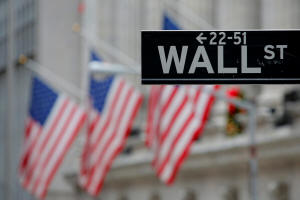As markets churn, investors hide in cash despite surging inflation
 Send a link to a friend
Send a link to a friend
 [September 17, 2022] By
Lewis Krauskopf [September 17, 2022] By
Lewis Krauskopf
NEW YORK (Reuters) - A tough year in
markets is leading some investors to seek refuge in cash, as they
capitalize on higher interest rates and await chances to buy stocks and
bonds at cheaper prices.
The Federal Reserve has roiled markets in 2022 as it implements huge
rate hikes in an effort to moderate the steepest inflation in 40 years.
But higher rates are also translating into better rates for money market
funds, which had returned virtually nothing since the pandemic began in
2020.
That’s made cash a more attractive hideout for investors seeking shelter
from market gyrations - even though the highest inflation in forty years
has dented its appeal.
Fund managers increased their average cash balances to 6.1% in
September, the highest level in more than two decades, a widely followed
survey from BofA Global Research showed.
Assets in money market funds have stayed elevated since jumping after
the pandemic began, coming in at $4.44 trillion as of last month, not
far from their peak of $4.67 trillion in May 2020, according to
Refinitiv Lipper.
"Cash is now becoming a viable asset class because of what has happened
to interest rates," said Paul Nolte of Kingsview Investment Management,
who said the portfolios he manages have 10 to 15% in cash versus less
than 5% typically.

"It gives me the opportunity in a couple months to look around in the
financial markets and redeploy if the markets and the economy look
better," said Nolte.
Investors are looking to next week's Fed meeting, at which the central
bank is expected to enact another jumbo rate hike, following this week's
consumer price index report that came in hotter than expected.
The S&P 500 fell 4.8% in the past week and is down 18.7% this year. The
ICE BofA U.S. Treasury Index is on pace for its biggest annual drop on
record.
Meanwhile, taxable money market funds had returned 0.4% so far this year
as of the end of August, according to the Crane 100 Money Fund index, an
average of the 100 largest such funds.
The average yield in the Crane index is 2.08%, up from 0.02% at the
start of the year and the highest level since July 2019.
"They are looking better and their competition is looking worse," said
Peter Crane, president of Crane Data, which publishes the money fund
index.
[to top of second column] |

A street sign for Wall Street is seen
outside the New York Stock Exchange (NYSE) in Manhattan, New York
City, U.S. December 28, 2016. REUTERS/Andrew Kelly

Of course, sitting in cash has its drawbacks, including the
possibility of missing a sudden reversal that takes prices for
stocks and bonds higher. Inflation, which stood at 8.3% on an annual
basis last month, has also dented the appeal of cash.
"Certainly you are losing some purchasing power with inflation
running at 8-plus percent, but... you are taking some money off the
table at a risky time for equity markets," said Peter Tuz, president
of Chase Investment Counsel. "Your equities could be down 8% in two
weeks.”
While an obvious sign of caution among investors, extreme levels of
cash are sometimes viewed as a so-called contrarian indicator that
bodes well for equities, said Mark Hackett, Nationwide’s chief of
investment research, especially when taken in concert with other
measures of investor pessimism.
Hackett believes stocks may stay volatile in the near-term, amid
various risks including potential earnings weakness along with high
inflation and the hawkish Fed, but he is more upbeat about the
outlook for equities over the next six months.
"There’s a degree of a coiled spring developing where if everybody
is already on the sidelines at some point there is nobody left to go
on the sidelines and that leads you to potentially any piece of good
news resulting in a very outsized move," Hackett said.
David Kotok, chief investment officer at Cumberland Advisors, said
his U.S. equity portfolio made up of exchange-traded funds is
currently 48% in cash after being almost fully invested in equity
markets last year.
Stocks are too expensive given risks including rising interest
rates, the potential for a Fed-induced recession and geopolitical
tensions, Kotok said.
"So I want cash," Kotok said. "I want the cash to be able to deploy
back into the stock market at lower prices or substantially lower
prices, and I don’t know which opportunity I’ll have but the only
way I can seize it is to be holding that amount of cash.”
(Reporting by Lewis Krauskopf; Editing by Ira Iosebashvili and Diane
Craft)
[© 2022 Thomson Reuters. All rights
reserved.]
This material may not be published,
broadcast, rewritten or redistributed.
Thompson Reuters is solely responsible for this content.
 |